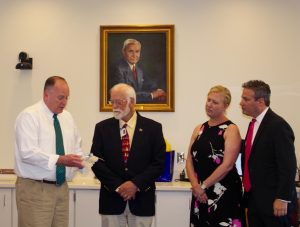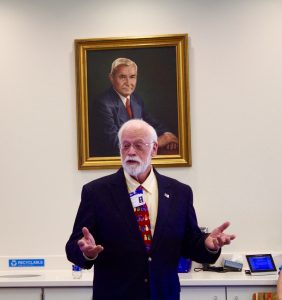Those of you who follow me on Facebook know that my husband Woody and I were in Philadelphia last week where Woody was recognized for his leadership and work in the field of stuttering. The new “Woody Starkweather Intensive Stuttering Program” at Children’s Hospital of Pennsylvania (CHOP) is now alive and well.
Today, I want to talk about stuttering, my husband, and how proud I am of him.

While Woody’s main profession since the late 1960s has been as a professor of speech pathology, first at Hunter College in New York, then at Temple University in Philadelphia, he always maintained a private practice, seeing clients who struggled with their speech. In other words, people who stutter.
If you printed out his full resume, it’d be over an inch thick. So, I’ll just run through the highlights of his 30 + year career.
- He published much: nine books (including our jointly authored award-winning text Stuttering) and a slew of articles and chapters. That’s because he wakes up at 4 a.m. He’s always done that. With no cows to milk, what else is there to do but write?
- He spoke at lots of conferences around the world. Often as the keynote speaker. That’s because he’s a very entertaining, eloquent, and educational speaker.
- He helped create and then served as the first president of the International Fluency Association. That’s because he sees the possibilities that can come when good folks get together.
- He wrote the guidelines for practice adopted by ASHA, the American Speech and Hearing Association, for stuttering therapy. That’s because he’s a great writer (and once worked for ASHA as their publications editor).
- He created and ran an email discussion list serve from Temple University (STUTT-L, from 1988 to 2003) that brought stutterers from all over the world together with those doing research in stuttering. (And it brought us together too.) That’s because he believes that speech therapists can learn most of what they need to know about stuttering from the person who stutters.
- He worked with me to provide stuttering workshops and intensive retreats around the world and in our homes in Chincoteague, VA and Philadelphia, PA for people who stutter and the professionals who treat them. That’s because he had much to offer, even after he retired from Temple.
- He worked personally with thousands of stuttering clients. That’s because he cares.
One of those former clients, Sean Frankel, recently made a significant contribution to the Children’s Hospital of Pennsylvania (commonly known as CHOP) to endow a new stuttering program. Run by Dr. Joseph Donaher, a former student of Woody’s at Temple University, the program will henceforth be known as the Woody Starkweather Intensive Stuttering Program.

As a person who grew up stuttering and who allowed that stutter to “drive my bus” (as I like to say) for far too many years, I’m aware of how much misinformation is still afloat out there. What better way to help minimize that, than to let Woody answer a few questions that I know lay folks often think. And I know this because I once heard these questions myself.

Why can’t stutterers just relax?
This assumes that stuttering is caused by tension or anxiety. It’s not and telling someone to relax is counterproductive. It’s more likely that the stuttering causes anxiety than the other way around and few people can voluntarily relax when they are feeling tense. You try it. The request to relax introduces more tension than was present to begin with.
Why can’t they just talk more slowly?
When a stutterer slows down, he does often speak with more fluency, for a while. But talking more slowly isn’t easy for anyone to do except for a short period of time. So, it is not really a practical solution. And consider that talking more slowly means that the person will take longer to say what he wants, which is what stuttering does too. So talking slowly is just substituting one form of slowed communication for another.
I stutter now and then. But I’m not a stutterer, am I?
Probably not. Everyone stumbles in their speech from time to time, but the nonstutterer usually corrects the stumble and moves on without any emotional reaction. I often introduce myself as a “normally disfluent speaker.” Real stutterers get stuck more noticeably and with more muscular tension. Many of them have an emotional reaction too, as they struggle and fight with a recalcitrant speech mechanism. It is not the original stumble, the core stutter, but the resultant struggle and the emotional reaction that make stuttering a problem.
I know someone at work who stutters. He never talks about it, so when he starts stuttering or gets stuck on a sound, I never know what to do. I get frustrated waiting for him. Sometimes I know what he’s going to say and I just say it for him. Is there something I could say or do that would help him talk better?
Realize that you are probably not as frustrated as he is. Just wait for him to finish. Don’t supply words for him or try to finish his sentences. Stutterers hate that. He can speak for himself, although it might take a little more time. Be patient. Listen to the ideas he is trying to convey, rather than the way he is saying them. He’s trying to communicate to you, so don’t get in the way of that.
What’s the most important piece of information to impart about stuttering in a forum like this? Here’s your chance.
Stuttering is like snowflakes, in that no two stutterers are going to stutter the same way. It’s very individualistic. While it may begin in a fairly predictable way — the intuitive reaction for a child when confronted with frustration is to push harder — the course it follows is entirely dependent upon the way the child himself, his parents, listeners, and significant others in his life, react. If the child can’t talk about what is happening when he tries to speak, shame will be the inevitable result; then it’ll get really complicated.
And that’s where we will end. With the idea that TALKING ABOUT stuttering is a good thing. An open heart, a curious mind, and a compassionate soul will guide you in the how. But talk about it we must. We must get stuttering out of that closet that shame.
One of my former clients was there to say hello and reminded me of something I had once said that had stayed with him ever since (we’re talking twenty years here). “Yes, I stutter. But I also sneeze.” I imagine I went on to say that both interrupt my speech in the moment. Why do we give so much more attention to the stuttering?

How about you? Does someone you know stutter? Have you ever asked those questions we asked above? Are there any other questions you’d like answered about this very unusual disorder?
Next week: We’ll start a new series with a group of women with a perspective on the USA that might be different than we’re used to.
Carolyn
I stuttered as a child because the schoolteachers tried to make me write with my right hand and it just screwed up my ability to think and talk. Fortunately my mother was a strong woman who sorted them out but it took a long time to see the stutter go and it still comes back occasionally to haunt me. (Statistics is my bugbear especially and I’ve developed a coping strategy of breathing deeply before pronouncing.) People like Woody are worth their weight in gold – I was sent to elocution and acting classes and I believe it was the joy of the spoken word that helped me.
Janet Givens
Hi Carolyn. Thanks for starting things off today. Your comment reminds me of Woody’s model of childhood onset stuttering, what’s commonly referred to as “the demands and capacities” model. It’s a fairly simple balancing act of “demands” on the child (e.g., lots of questions, focus, intensity) at a time when the particular child’s “capacity” for language is still developing. I’m wondering if that extra demand your teachers put on you to change your dominant hand (not ever too successful I believe) was enough “demand” to make that kind of difference. So glad your mother stepped in and took care of you.
James Earl Jones, the actor (he was famous before Darth Vader), is a stutterer and credits poetry reading with helping him. He says that’s why he never does impromptu speaking gigs. Always has a script. And he did elocution, too. You’re in good company it looks like.
Merril Smith
This is such a lovely tribute to Woody, Janet, and a good Q & A on stuttering, too.
It was wonderful to see you again in Philadelphia and to meet Woody, too!
I gave you a little shout out in my post on Monday.
Janet Givens
Hi Merril. I loved your “We the people like our sweets” line in your poem on Monday. Thanks for the nod. But I do think we should let the record show that what I was searching for in there were sweets for the soon-to-visit grandchildren. (that little piece of chocolate nut fudge notwithstanding). If anyone is curious about what we’re talking about, here’s the link to Merril’s post on Monday: https://merrildsmith.wordpress.com/2017/05/22/dreams-of-the-future-ghosts-of-the-past/
Thanks for weighing in.
Merril Smith
I simply said that We the People like sweets, Janet. True, isn’t it?
(Honestly, I would have bought myself some chocolate there, if I didn’t have delicious chocolate truffles at home.)
Thank you for sharing the link!
Janet Givens
It sounds like you are saying one can have too much chocolate. To that I say, in the spirit of our founding fathers, balderdash.
Merril Smith
Hahaha. No, never too much chocolate!
Susan Jackson
I probably knew one stutterer in my life (years ago) but haven’t encountered any for years. It must be so terribly hard to overcome and probably with twitter and facebook you just type and don’t talk.
Janet Givens
The email discussion list that Woody ran for a decade or more (1987 – 2003) was often the very first time stutterers could “say” what they wanted to say and feel heard. Typing away was a real gift. AND, writing this, I realize I left that out of the list of his accomplishments. I must rectify that quickly. It’s how he and I met, you know. Thanks for stopping by.
Laurie Buchanan
Janet — This is an incredible tribute. My hat is off to Woody!
Janet Givens
Thank you Laurie. I shall pass on your kind words.
Sharon Lippincott
Great advice. Thanks for that. I have not encountered many stutterers, but many years ago I met a man who claimed that joining Toastmasters and participating fully helped him overcome forty some years of stuttering. He had only the slightest occasional hesitation when I met him. I’m a huge fan of Toastmasters for improving any sort of communication skill, but would not have thought to recommend it as stuttering therapy. Worth a try!
Janet Givens
I can believe that, Sharon. For me, I had my new 12-Step meetings where I had to give my name a few times a week and often was asked to “tell my story” — all practice in speaking before others. For too many though, their shame is so great that all they want to do is hide it and many are more successful at that than you’d guess. Thanks for adding to the conversation.
Kathleen Pooler
What a lovely tribute to Woody, Janet. My congratulations go out to him for his impressive achievements in raising awareness about stuttering. I agree, we need to keep talking about it and your Q&A is a great place to start.
Janet Givens
Thanks Kathy. I so appreciate your support.
Sharon Lippincott
By fascinating coincidence, I began reading Lily Koppel’s book, THE ASTRONAUT’S WIVES this evening. I just learned that Annie Glenn stuttered. The following passage is directly relevant to the terrific contents of this post:
Annie had a terrible stutter. … Annie was very sensitive to others speaking, for she knew that when she herself needed to speak, her interlocutor would have to wait out her stutter and be patient while she formed her words. She didn’t want anyone finishing her sentences for her. Betty had to bite her tongue to hold herself back.
The chapter goes on to detail Annie’s coping strategy for shopping: she’d write notes to the sales clerks. … Fascinating!
Janet Givens
Funny you mention Annie Glenn, Sharon. The first time I spoke in front of a large audience (large to me then, about 500 people) was at the annual convention of the National Stuttering Association in 1994. I facilitated the Q&A after Mrs. Glenn’s keynote address. She is a gracious and most generous person.
Joe Welch
Thank you so much, Janet, for this wonderful tribute to Woody! When mention was made of this honor at chorus rehearsal, I for one was unaware of the extent of Woody’s background, the significance of his career-long contribution to stuttering therapy. Thank you for raising my/our awareness and please pass on my overdue congratulations to Woody!
Janet Givens
Thank you, Joe. I shall indeed.
Tim Fearnside
Hi Janet – greetings from Idaho’s Central Mountains (where there’s no wi-fi, and the cell service mostly stinks). Nice article, and a wonderful tribute to Woody, who sounds like the kind of guy I’d enjoy grabbing a beer with and simply picking his brain for a while. I learned a bit about stuttering from this piece — particularly that very first question-and-answer — i.e., I might have thought that anxiety had more to do with the origins of stuttering in an individual. So much to learn . . . I hope all is well with you both – T
– T
Janet Givens
“No Wi-Fi and spotty cell service?” Sounds like parts of Vermont. Mountains can be a challenge, but aren’t they magnificent!
I’m so glad we could teach you something new about stuttering. I’ve learned much from Woody over the years about the complexity of human speech production, something most people are able to take for granted, but 1% are not. There was a time when I’m sure Woody would have loved to bend your ear over a beer.
Safe travels down that mountain.
Sue Slaght
Sincere congratulations to your husband on the award and all he has achieved in his lifetime. Your admiration for him and his work warms my heart. I read intently the information provided here and was especially grateful for the section on what to do when someone stutters. My Great Uncle stuttered and I am afraid in a rural setting on the Canadian prairies he had little support.
A wonderful post and again congratulations on a lifetime of brilliant work. Bravo
Janet Givens
Hello Sue and welcome. I shall pass on your good words to Woody. Thanks too for mentioning your great uncle. Not sure he was any worse off living out in the boonies. I lived in a city and good information was in its infancy back then and very hard to come by.
For my other readers, I want to add that Sue writes a very impressive travel blog, Travel Tales of Life. And this week she tells us how to get by with just a single carryon. She’s awakened the old travel bug in me.
Voon Pang
Dear Janet
I never met you or Woody but wanted to say ‘congratulations’ to Woody. I have been significantly influenced by his work and have received training by Sheryl Gottwald and Marie-Christine Franken. I also really enjoyed your 1997 “Stuttering” book as it delineated the multiple factors involved in stuttering. Being based in New Zealand I know that you and Woody visited the centre I work at, the Stuttering Treatment and Research Trust (START) many years ago. If you do come down under, please say ‘hello’! It would be wonderful to meet you in person and wish you both all the best!
Warm regards
Voon Pang (Speech Language Therapist)
Janet Givens
Voon Pang, Hello. I’m so sorry I missed your Comment when it first came in. I’m not sure how that happened. I apologize. I shall pass along your kind remarks to Woody. It is a small world when you work with those who really understand stuttering. Thank you for saying hello.
Janet Givens recently posted…Talking About Race: Another 50-year look back